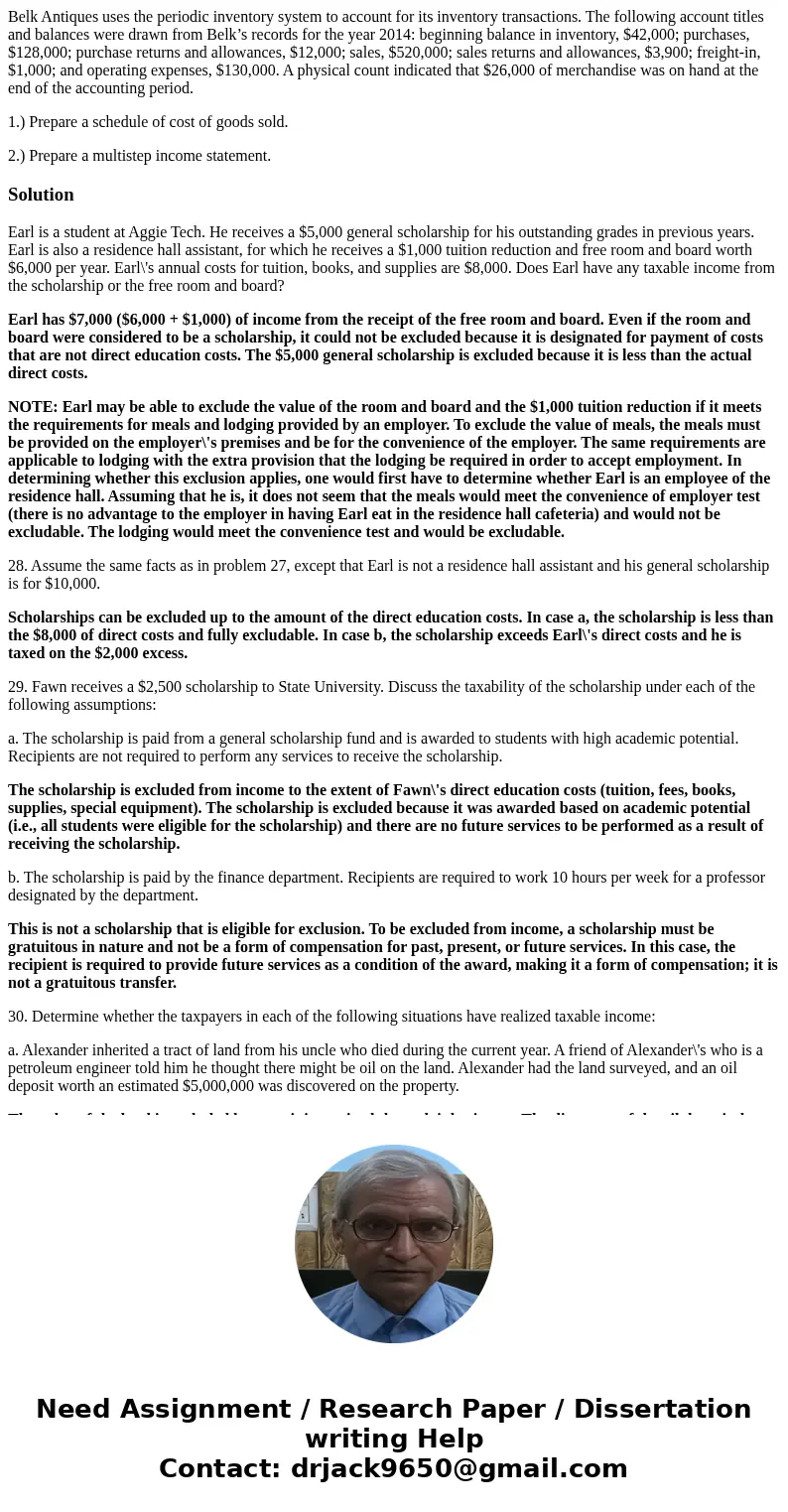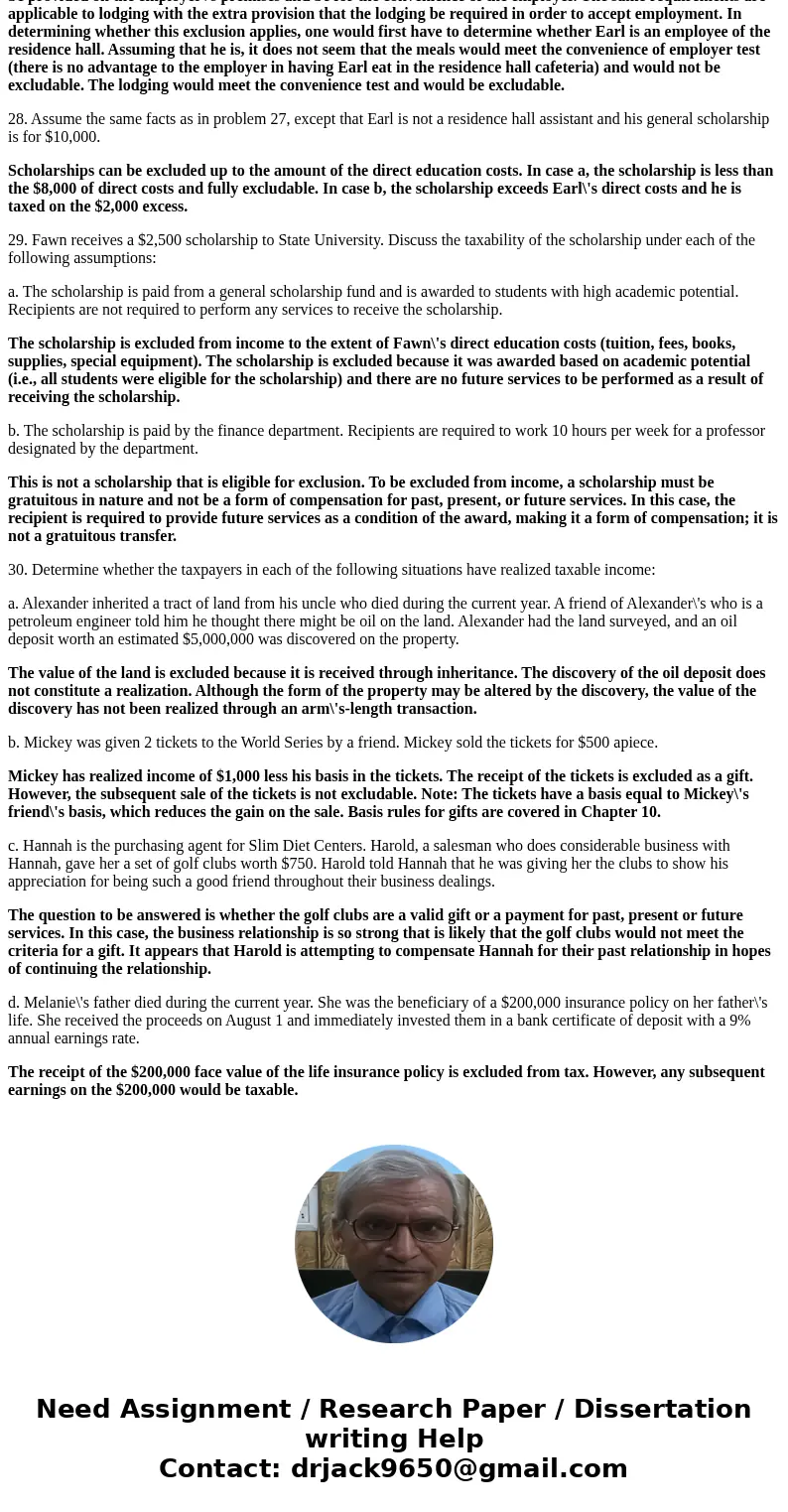Belk Antiques uses the periodic inventory system to account
Belk Antiques uses the periodic inventory system to account for its inventory transactions. The following account titles and balances were drawn from Belk’s records for the year 2014: beginning balance in inventory, $42,000; purchases, $128,000; purchase returns and allowances, $12,000; sales, $520,000; sales returns and allowances, $3,900; freight-in, $1,000; and operating expenses, $130,000. A physical count indicated that $26,000 of merchandise was on hand at the end of the accounting period.
1.) Prepare a schedule of cost of goods sold.
2.) Prepare a multistep income statement.
Solution
Earl is a student at Aggie Tech. He receives a $5,000 general scholarship for his outstanding grades in previous years. Earl is also a residence hall assistant, for which he receives a $1,000 tuition reduction and free room and board worth $6,000 per year. Earl\'s annual costs for tuition, books, and supplies are $8,000. Does Earl have any taxable income from the scholarship or the free room and board?
Earl has $7,000 ($6,000 + $1,000) of income from the receipt of the free room and board. Even if the room and board were considered to be a scholarship, it could not be excluded because it is designated for payment of costs that are not direct education costs. The $5,000 general scholarship is excluded because it is less than the actual direct costs.
NOTE: Earl may be able to exclude the value of the room and board and the $1,000 tuition reduction if it meets the requirements for meals and lodging provided by an employer. To exclude the value of meals, the meals must be provided on the employer\'s premises and be for the convenience of the employer. The same requirements are applicable to lodging with the extra provision that the lodging be required in order to accept employment. In determining whether this exclusion applies, one would first have to determine whether Earl is an employee of the residence hall. Assuming that he is, it does not seem that the meals would meet the convenience of employer test (there is no advantage to the employer in having Earl eat in the residence hall cafeteria) and would not be excludable. The lodging would meet the convenience test and would be excludable.
28. Assume the same facts as in problem 27, except that Earl is not a residence hall assistant and his general scholarship is for $10,000.
Scholarships can be excluded up to the amount of the direct education costs. In case a, the scholarship is less than the $8,000 of direct costs and fully excludable. In case b, the scholarship exceeds Earl\'s direct costs and he is taxed on the $2,000 excess.
29. Fawn receives a $2,500 scholarship to State University. Discuss the taxability of the scholarship under each of the following assumptions:
a. The scholarship is paid from a general scholarship fund and is awarded to students with high academic potential. Recipients are not required to perform any services to receive the scholarship.
The scholarship is excluded from income to the extent of Fawn\'s direct education costs (tuition, fees, books, supplies, special equipment). The scholarship is excluded because it was awarded based on academic potential (i.e., all students were eligible for the scholarship) and there are no future services to be performed as a result of receiving the scholarship.
b. The scholarship is paid by the finance department. Recipients are required to work 10 hours per week for a professor designated by the department.
This is not a scholarship that is eligible for exclusion. To be excluded from income, a scholarship must be gratuitous in nature and not be a form of compensation for past, present, or future services. In this case, the recipient is required to provide future services as a condition of the award, making it a form of compensation; it is not a gratuitous transfer.
30. Determine whether the taxpayers in each of the following situations have realized taxable income:
a. Alexander inherited a tract of land from his uncle who died during the current year. A friend of Alexander\'s who is a petroleum engineer told him he thought there might be oil on the land. Alexander had the land surveyed, and an oil deposit worth an estimated $5,000,000 was discovered on the property.
The value of the land is excluded because it is received through inheritance. The discovery of the oil deposit does not constitute a realization. Although the form of the property may be altered by the discovery, the value of the discovery has not been realized through an arm\'s-length transaction.
b. Mickey was given 2 tickets to the World Series by a friend. Mickey sold the tickets for $500 apiece.
Mickey has realized income of $1,000 less his basis in the tickets. The receipt of the tickets is excluded as a gift. However, the subsequent sale of the tickets is not excludable. Note: The tickets have a basis equal to Mickey\'s friend\'s basis, which reduces the gain on the sale. Basis rules for gifts are covered in Chapter 10.
c. Hannah is the purchasing agent for Slim Diet Centers. Harold, a salesman who does considerable business with Hannah, gave her a set of golf clubs worth $750. Harold told Hannah that he was giving her the clubs to show his appreciation for being such a good friend throughout their business dealings.
The question to be answered is whether the golf clubs are a valid gift or a payment for past, present or future services. In this case, the business relationship is so strong that is likely that the golf clubs would not meet the criteria for a gift. It appears that Harold is attempting to compensate Hannah for their past relationship in hopes of continuing the relationship.
d. Melanie\'s father died during the current year. She was the beneficiary of a $200,000 insurance policy on her father\'s life. She received the proceeds on August 1 and immediately invested them in a bank certificate of deposit with a 9% annual earnings rate.
The receipt of the $200,000 face value of the life insurance policy is excluded from tax. However, any subsequent earnings on the $200,000 would be taxable.


 Homework Sourse
Homework Sourse